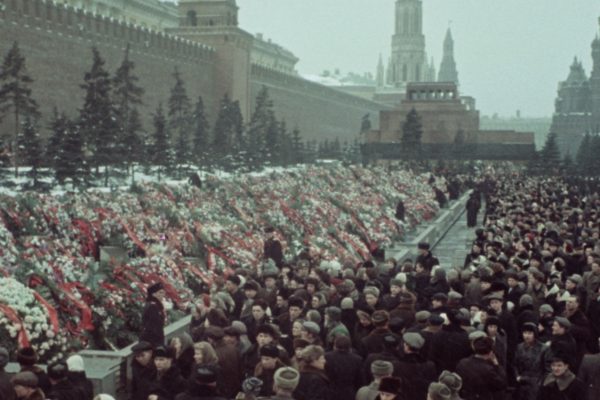Ukrainian director Sergei Loznitsa is known for his documentary-style, mock-realist approach to his feature films such as A Gentle Creature and Donbass. It’s no surprise that he’s also a prolific producer of non-fictional work too. His latest is a granular depiction of the massive funeral of Joseph Stalin following his death in March 1953. Using a vast profusion of archive sources, State Funeral is an exhaustive and exhausting document, one with a deadening repetitiveness that stretches the film’s already epic length to unbearable quantum elasticity.
It starts interestingly enough. We make several stops throughout the USSR, from Ukraine to Kyrgystan, as the details of Uncle Joe’s death are announced to townsfolk, peasants and workers. Nothing however, from rural Georgia, from where the young Koba hailed. These public bulletins, delivered by loudspeaker are curiously specific about the cause of Stalin’s death and laced with propagandist rhetoric. The messages are left unadorned by any external narrative voice; in many cases just flowery words falling onto the stony ground of the remote areas left to starve during the catastrophic Holodomor a few decades earlier.
There follows footage of grim-faced delegates from other affiliated countries, and the endless crowds winding through the Kremlin to pay their respects. From swaddled babies to wizened babushkas they filter past their fallen leader, who lies waxily resplendent in the midst of an Eden of funereal foliage, and acts as a creepy synecdoche for the entire affair; grandiose and kitsch in equal measure. This flow of penitent humanity is constant. Clearly, repetition is the key strategy for Loznitsa, and there’s no denying that the footage itself is wonderful. It was, by any standards an unusual few days in the Soviet Union, but both the quantity and quality of both colour and monochrome material is stunning. However, the nature of the director’s contextual approach means the film quickly becomes interminable as it asks the viewer to glean all authorial intent from the images themselves.
Perhaps it aims to force us to think about the performative nature of the grief on display (several people eye the camera warily before finding fresh reserves of lachrymosity), or the grotesque ritualist worship for a figure that was the head of a supposedly atheistic ideology. Was everyone acting? Or were at least some of the mourners sucked in completely by this apparent mass psychosis? You begin to wonder what individuals are thinking as the camera lingers. Are they horrified by the charade and their part in it? You notice unusual details like the curious uniformity of the haircuts sported by the men. You spot the occasional startling moment in the homogenous mass; artists daubing away by the open casket, among them a sculptor thudding away at a fresh lump of clay! Or there’s the coffin itself as it’s carried out, the dead face visible through a glass dome. With the horrific lacy, flouncy red material draped over the casket, the effect is of a bubble car wearing one of Bet Lynch‘s old nightgowns. Little twinkling nuggets of absurdity such as this are most welcome, but they fail to alleviate the grinding tedium of Loznitsa’s method.
The intent of State Funeral is obviously to show the bitter irony at the heart of Stalin’s dictatorship. As closing text states, within three years Stalinism had been denounced as a personality cult by the very men who delivered his gushing eulogies atop Lenin’s mausoleum (or at least most of them, Lavrentiy Beria received a bullet to the skull before 1953 was out). The text also informs us of the millions who were executed, starved, or who simply disappeared, which is in no way new information. This raises the central question: for whom was this made? We know of the atrocities, and we know how the USSR and other Communist states were run. There’s no original angle to explore, no dramatic new light to shine. It’s difficult therefore to justify the necessity of this punishing exercise, and even more difficult to recommend.
As Part of Glasgow Film Festival 2020
